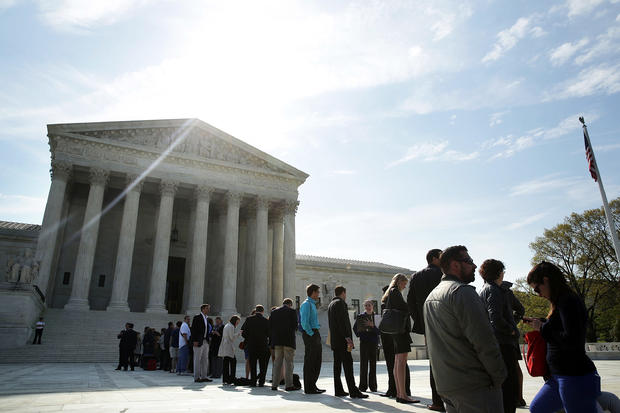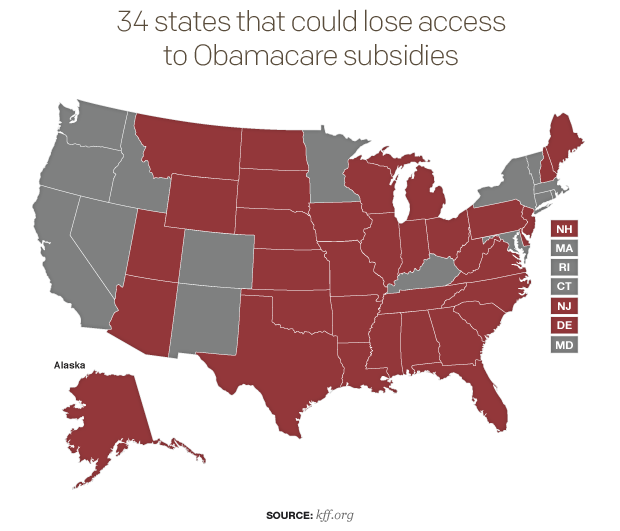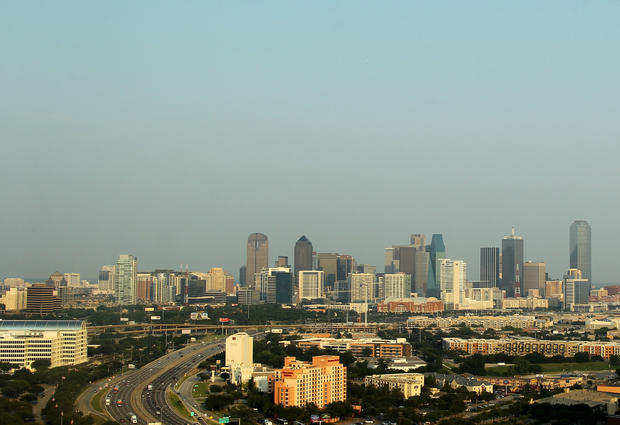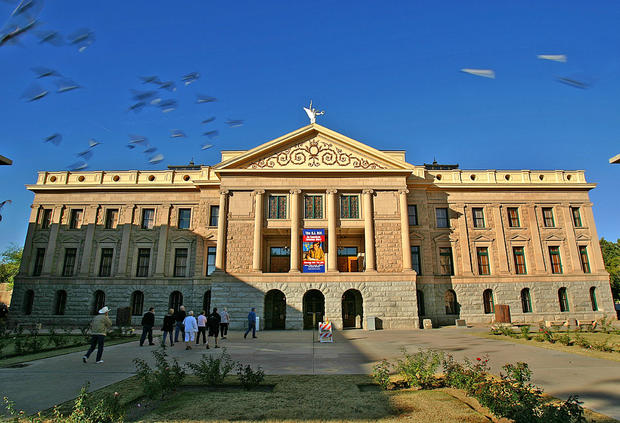What's left for the Supreme Court?
The Supreme Court has 11 rulings left to issue before the end of the month. The two biggest are likely to be among the last decisions - one Obamacare case that threatens the president's signature health care law, and the other on the constitutionality of same-sex marriage. The justices will also weigh in on lethal injections, Environmental Protection Agency (EPA) regulations, housing discrimination and redistricting. CBS News looks at six of the court's outstanding cases.
Stephanie Condon contributed to this story.
Obamacare
King v. Burwell
This case began with four words in the statute written by Congress: "established by the state." The challengers argue that the use of those words means that Congress intended to limit subsidies to consumers purchasing their insurance through the state exchanges, and not one of the 34 states with federally-run exchanges.
If the Supreme Court agrees, some six million people could lose federal assistance to purchase their insurance coverage, which would make health insurance unaffordable for many. These people are largely concentrated in GOP-led states like Texas and Florida.
"It is really no exaggeration to say that this case could be the ballgame for that entire law," CBS News Chief Legal Correspondent Jan Crawford said. "The Affordable Care Act could become the unaffordable care act. Most of these people would lose their policies because they couldn't pay those high premiums."
"This law in many ways hangs in the balance with this decision," Crawford said.
One in six people who get their health insurance through the exchanges pay $100 or less a month for coverage. Eighty-seven percent receive subsidies.
Many governors have been silent on what they will do if the court rules that the federal government cannot offer subsidies in states where they run the exchanges. At least a handful of Republican-led states have completely rejected the idea of creating a state-run exchange. According to Reuters, leaders in Louisiana, Mississippi, Nebraska, South Carolina and Wisconsin are opposed to transitioning to state-based marketplaces. Meanwhile, officials in Georgia, Missouri, Montana and Tennessee told Reuters that GOP opposition to Obamacare made such a transition unlikely.
And even if state lawmakers did want to build a state marketplace in order to ensure that residents continued to receive subsidies, it would be a costly and lengthy process that would likely leave people without subsidies - and possibly insurance - for several months or even years.
The justices were sharply divided when they heard oral arguments on the case in March.
Same-sex marriage
Obergefell v. Hodges
When the Supreme Court struck down a provision of the 17-year-old Defense of Marriage Act (DOMA) that denied federal benefits to same-sex couples legally married in 2013, it paved the way for dozens of challenges to state laws banning same-sex marriage. Many of those laws were ruled unconstitutional and now same-sex marriage is permitted in 37 states and Washington, D.C.
But the Supreme Court sidestepped the question of whether marriage is a constitutional right for same-sex and opposite-sex couples alike. In January, they finally agreed to hear a case that would answer that question.
In the case before the court, Ohio resident Jim Obergefell is suing the state for recognition of his marriage to John Arthur. The pair were legally married in Maryland where same-sex marriage is legal, but when Arthur died two years ago the state of Ohio refused to put Obergefell's name on the death certificate as the surviving spouse.
As with the Obamacare case, a ruling against same-sex marriage could have complicated implications. In 20 of the 37 states where same-sex couples can marry legally, federal judges struck down a marriage ban - meaning many of those states could immediately resume denying marriage licenses to gay couples depending on the exact legal situation.
"It would be chaos because in those 20 states the right to same-sex marriage would disappear and it would really throw into question all of those marriages that now have been legally performed in those states," Crawford said.
Supreme Court Justice Anthony Kennedy is widely believed to be the person that will swing the decision in favor of either the four judges who support same-sex marriage or the four that don't. But he didn't tip his hand during the historic arguments in April.
In each of the three key decisions where the Supreme Court has expanded rights for gay, lesbian, bisexual and transgender individuals, Kennedy has voted with the majority.
Lethal injection
Glossip v. Gross
Three inmates on death row in Okhahoma are challenging states' rights to use a sedative called midazolam as part of a three-drug combination sometimes used for lethal injections. The plaintiffs argue that the drug does not effectively prevent severe pain and suffering when the drugs to stop a person's heart are administered.
Oklahoma first used the drug during the botched execution of inmate Clayton Lockett in 2014. The Department of Corrections director called off the execution after it did not appear that the midazolam had successfully rendered Lockett unconscious, but he died of a massive heart attack in the death chamber minutes later.
President Obama later called the execution "deeply troubling" and called for an analysis of the application of the death penalty even though he said he believes it is merited in some cases.
The state of Oklahoma defends its protocol and points to several other courts that have agreed. Each of the 32 states that have the death penalty use lethal injection as their main method of execution, and in 2008 the Supreme Court ruled that states could use a combination of chemicals to do so without violating the ban on cruel and unusual punishment.
But a wave of sentiment and legislation against the death penalty in Europe has caused a shortage in the availability of sodium thiopental in the U.S., leaving state corrections departments hunting for new options.
The arguments in late April turned heated, with several justices voicing their opinions on the broader issue of the death penalty.
"Let's be honest about what's going on here," said Justice Samuel Alito. "Is it appropriate for the judiciary to countenance what amounts to a guerrilla war against the death penalty, which consists of efforts to make it impossible for the states to obtain drugs that could be used to carry out capital punishment with little, if any, pain?"
Clean air
National Mining Assn. v. EPA, Michigan v. EPA, Utility Air Regulatory Group v. EPA
A group of Republican-led states and industry groups are fighting regulations from the Environmental Protection Agency (EPA) that seek to limit air pollutants from power plants and factories seen as harmful to the people and to the environment.
The question is whether the EPA should have considered the costs of regulations before approving them. The agency found that it would cost $9.6 billion a year for plants to install the equipment necessary to remove pollutants like mercury before they were sent into the air, but it also argues that the annual benefit is worth $37 billion to $90 billion by preventing up to 11,000 deaths, 4,700 nonfatal heart attacks and 540,000 missed days of work.
At the arguments in March - which lasted 90 minutes instead of the usual 60 - the justices appeared divided on ideological lines, which could leave Kennedy as the swing vote.
The EPA won its case before the U.S. Court of Appeals for Washington D.C. It has also fared well before the Supreme Court in recent years in its attempts to limit power plant pollution and cut greenhouse gas emissions.
Housing discrimination
Texas Dept. of Housing and Community Affairs v. The Inclusive Communities Project, Inc.
The Inclusive Communities Project, a group that helps lower-income families find housing in the Dallas suburbs, is suing the Texas Department of Housing and Community Affairs over its practice of issuing tax credits for low-income housing. The group showed with a statistical analysis that the department disproportionately approved more tax-credit applications for housing in minority neighborhoods than in affluent white suburbs. Even if the housing department was attempting to provide affordable housing in a race-neutral way, the Inclusive Communities Project argues that its decisions resulted in racial segregation.
The case rests on the interpretation of the 1968 Fair Housing Act. The law gives people two ways to challenge discriminatory housing policies -- they can either claim that someone intentionally discriminated against them on the basis of race, or they can claim that a policy or practice had an unintentional "disparate impact" on minorities. While it's still challenging to prove "disparate impact" cases, it's easier to prove than intentional racism.
In the past, courts have allowed so-called "disparate impact" cases and the Supreme Court will decide whether to continue to allow them. Scotusblog notes that during the argument, the liberal justices defended the practice, while most of the conservatives -- including moderate Justice Anthony Kennedy -- were skeptical. However, conservative Justice Antonin Scalia seemed to be weighing both sides of the case carefully.
Scalia and the other conservatives reportedly were open to the argument that potential "disparate impact" liability could force housing developers and local governments to adopt racial quotas or other questionable practices.
One defender of disparate impact claims is Sen. Elizabeth Warren, D-Massachusetts, who argued in a Washington Post op-ed that eliminating such claims would constitute a "systematic assault" on core civil rights laws.
Redistricting
Arizona State Legislature v. Arizona Independent Redistricting Commission
Republican lawmakers in Arizona want the state legislature to be redrawing congressional district boundaries, not the state's voter-approved independent redistricting commission.
States redraw the boundaries every 10 years after a census is conducted, and the Arizona legislature is pointing to the Election Clause of the Constitution which specifically gives legislatures the power to set the time place and method of holding elections. But in a dozen states, a districting commission is involved in the process.
Supporters, including the Obama administration, say independent commission create more competitive elections and create a check to the party in power.
"When the district-drawing process is controlled by elected officials, the result too often is a process dominated by self-interest and partisan manipulation," political scientists Thomas Mann and Norman Ornstein wrote in support of that process.
But opponents say that's not the case.
"An unelected commission may benefit Republicans in one state and Democrats in another. But that simply underscores that once congressional redistricting is taken away from the state legislatures and given to another entity, there is no guarantee that such an entity will be neutral, or favor one party, or reflect the will of the people. Whatever their shortcomings, state legislatures are elected, politically accountable and hand-picked," Paul Clement, the lawyer for the Arizona Republican lawmakers, told the Associated Press.
Not all Republicans back their counterparts in Arizona. Three former Republican governors of California - which also has an independent commission drawing electoral maps - filed a brief in favor of the redistricting commission. They don't want to see the heavily Democratic California legislature drawing election maps.




